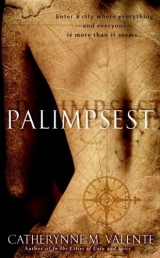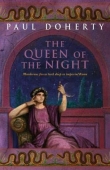
Текст книги "Palimpsest"
Автор книги: Catherynne M. Valente
Жанр:
Классическое фэнтези
сообщить о нарушении
Текущая страница: 16 (всего у книги 19 страниц)
Oduvaldo is content with his life. He served his time in the army, he feels justified in his contentment. Maud has labeled all her toys and the silverware as well with small, hand-printed placards, and he is confident in her inheritance. He has no secrets, save the bits of chocolate he smuggles into every drawer in the museum, so that after lunch, and coffee, and his churchwarden, he can slide a black square into his mouth, close his eyes, and let it melt on his tongue as the sun fades his artifacts with gentle, inexorable affection.
_______
Oleg huddles under what he understands, but does not care to know, is the Kausia Bridge. Angry, leviathan cockerels sneer down at him as a diffident rain begins to take an interest. The old man had not liked the look of him, and when he touched one of the musket balls, the old beast had silently, furiously, shoved him out of the door and into the first creamy puddles of the river. He wants to see that photograph again. He knuckles rain out of his eyes and squints at the current, at the towns across the water, at the lanterns on fishing boats still hoping for koi at this hour.
Miserable in one city, miserable in another. Oleg hunches against the gracefully arching underside of the bridge and turns up his collar. He has seen movies with men like him in them, turning up their collars against the rain, made wretched by women, beautiful in their gruff, cigarette-studded despair. He is not beautiful now if he ever was, he knows. He is a ghost, and it is not as pleasant as he had thought. Lyudmila was always so even-tempered, and the land of the dead, when she spoke of it, seemed to him a sensible and well-ordered place, full of all the sorts of things lands and nations ought to have, save that they are populated with people like his sister, with awful, unblinking gazes and unflinching faithfulness. Instead, he is cold and unhappy, and alone. He cannot find Lyudmila no matter how many impossible creatures he confronts. And it rains in the land of the dead, or whatever this place is; it rains and old men kick him out of shabby little shops.
A fish flops in the frothy pale water, its orange tail sweeping up and slapping thickly down again. Oleg scowls at it. He will not find her. She does not want to be found. Mila’s river is deep and she is a strong swimmer. She ought to be, by now.
“I’m sorry!” he screams to the river. “Come back!”
But she does not, and he knows, now that his head has cleared itself with small and shameful ritual, that it is because he does not deserve it. He has not made himself worthy, in this place, of this Lyudmila. It was all right that he had kissed her—she was not his sister, not really, and even so ghosts had no morality. But he had hurt her, and whatever the red stuff so like blood had been, he should not have spilled it. If one has the power, he thought, to make ghosts bleed, one must be careful with it, so careful.
He hears footsteps behind him, and whirls, expecting the usual city villainy—a knife, a gap-toothed lunatic. But it is just a sorrowful-looking man with glasses, soaked to the bone, his blue sweater leadened by rain. A carriage glides smoothly away above them, and Oleg blinks, baffled.
“Are you Oleg Sadakov?” the man says.
“Yes, why?”
“My name is Ludovico Conti. I came to find you.”
“I don’t want to be found,” he snaps. But the man looks familiar, instinctively familiar, like one’s own hand.
“Don’t you remember?” Ludovico says softly, his voice all but blown into the clouds. “The frog-woman. The ink. The girl with blue hair. I know I’m not memorable, but . . . ”
Oleg blinks again, his mind scrambling to assemble itself into a shape capable of understanding what he is being offered.
“The one with the bee stings sent me. Her name is November. She . . . she has access.To everything, it seems like. Anyway, I’m meant to tell you how to find us, in the real world, or, rather, the other world. I don’t think it’s any more real, not really . . . I don’t suppose you enjoy medieval literature?”
Oleg shakes his head dumbly.
“Well, there’s a book, like an encyclopedia. It’s called the Etymologiae. And it’s full of impossible things, really impossible, like griffins and phoenixes, right alongside ants and turtles and cities in Christendom. And I think this is like that. Palimpsest and the real world. An impossible beast sitting next to a possum. Or something like that.”
“Why do I need to find you?”
Ludovico looks up from under his lashes, as though he is afraid to give voice to what he knows.
“It would appear that is how we come here. Permanently. Emigration, you understand? The people we came with, if we can find them in the daylight, we can, somehow, be here for good, for all the time.”
Oleg reels. His heels slip in the beige mud, rendered impossibly silky and rich by the milky river. He sits down heavily in it, neither knowing nor caring.
“No,” he whispers. “I don’t want to come here. Permanently. Forever. It’s fine for people with accessand green carriages. But I work in restaurants and hide under bridges. I hurt her and she’ll never come back here. But maybe, in the real world—and it is more real, it has to be, it has to be—she’ll come home, and forgive me, and it will be all right again.”
“Who do you mean?”
“My sister. Lyudmila. Only . . . she’s not really my sister here. She’s like her, but she isn’t. She’s a . . . I think she said she’s a Pecia.”
Ludovico laughs, and it is a nervously genuine thing. He is warm, all of the sudden, in familiar territory. His laugh reverberates against the dark, wet stones, and the cockerels scowl on.
“Pecia? That means . . . well, I mean, it was a thing they used to do, when that book I mentioned was written. Instead of copying out enormous volumes they split it into pieces and sent it out to novices for copying. The originals were exemplars, the copied pieces were pecia. So I get it, actually, I get what you’re trying to say. She’s a copy. Someone made a copy for you.”
“Well, I was rude to it. Her. And it left me, it jumped into the river and I don’t know how to find it again. I have no interest in this place without her. So you’ll have to get on without me.”
Ludovico lays his head on his shoulder and contemplates Oleg. Oleg is defiantly self-conscious, he knows he must look horrid, and his sneer of masked desperation has very likely turned his face into a small gargoyle.
“Shall we find her, then, you and I?” Ludovico says simply, as though offering to take him to dinner. “The river is vast, and if she went into it we may find her. If we are stalwart. And worthy.”
Ludovico holds out his hand, an oversized and graceless thing, and it is a long moment before Oleg takes it.
“I hope you don’t have any qualms about stealing boats,” says Ludovico, and they move into the rain, the shallows, the curdling, splashing river. They pull clear the lines of a canopied summer ship with long, upturned ends sporting small wooden lynx-heads on either end. The canopy is probably blue when the sun shines, it is now a sodden, ugly black, its fringe gray instead of spangled. They are quiet; they are unseen. Ludovico gamely oars them onto the high, boisterous current, and Oleg slumps against a long box of frill-skirted children’s swimming garments and fishing poles.
The moon shows hesitantly through the clouds and hides again, blushing furiously.
“We’re in Rome, Oleg: 50 Via Manin Daniele. Find us. Please come.”
THREE
THE GIRL BEHIND BRIARS
Hester was gone. It was three days past now. She cried—Oleg remembered, as through a screen, her crying.
“I’m finished with this,” she said. “It’s too much. I am not a very good person, in the end. I can’t watch you—” she had clutched the wall as though it could clutch her back, “—with them. I can’t watch this thing happen. It is so ugly, so very ugly.”
And she had gone. Oleg had thought once or twice in the intervening time that she might have hurt herself, her eyes were so red, so whipped and worn when she left, but he didn’t have enough blood in him to fuel worry. He had not known her so very long. She was not a Princess of Cholera. She was not one of his people. There can be no real love between strangers.
Oleg had stumbled, painfully, on feet that had forgotten they were feet, to the grocer’s twice now, bereft of Hester and her diffident care. The juice of a real orange was so bright it burned his throat. He tried to eat bread, and a little meat, but it was too much for him. He could stand only cold, fatty soup from the deli which was not, after all, mythical, and water.
His bed had dried, or frozen. It didn’t matter which; he slept on it, dead weight, mute, ashen.
And on the fourth day, she came to him.
She sat on the edge of his bed in her little jacket with the fur-lined hood. There were great dark circles under her eyes and her lips had no color at all. There were dried tracks of spittle or vomit on her cheeks, and she stared at him hollowly, her knees drawn up to her chin.
But it was not his Lyudmila. It was Hester, and her tongue was swollen in her mouth, her speech slurred.
“Why are you here?” he asked fearfully, pulling up his sheet to protect himself.
“I don’t want to be.”
“Then go away. I don’t want you.”
“I did notice that.”
They stared at each other in silence, two wild animals who have caught each other’s eye in the wood, and neither sure which is the less frightful.
“Are you okay?” Oleg finally whispered, his voice faint and weak. Hester narrowed her eyes and swallowed.
“I’m not feeling so well.”
“Me neither.”
Hester smiled then, a leering, half-hinged smile. “I think we could have been lovers, you know, real lovers, the kind that make coffee for each other and read the same books. We have so much in common. Both of us dying of despair. Murdered by a whole city.”
Hester crawled into bed with him, pulling his sheets up over her cold shoulder. She put her arms around his neck. “Remember that story you told me?” she whispered, her voice a little slurry and strange. “About the land of the dead? Well, I have one for you. Once upon a time a girl swallowed all of her pills at once because she wanted to stop dreaming, and the angel she thought would save her turned out to be a crazy sack of shit. Do you like this story? I like it. It has a good ending.” She kissed his cheek, and ever after he would feel the mark. Her voice softened. “Do you think, if Columbus had stood on the bow of his ship, looked at the New World and understood everything to come, all the disease and death and betrayal, all the ugliness, all the blood—do you think he would have embraced it, called it paradise? Or do you think he would have run home as fast as he could? I just want to go home.”
Her eyes were so big in the dark of his bedroom, like locks, opening all the way to the Atlantic, and beyond, to the salt sea of the dead and all the dark islands there.
Hester turned away from Oleg and threw up onto the cold floor. He put his hand on her back and held her hair as it kept coming, all her grief, all her loneliness, everything, and he could not stop it. Her body heaved under his hands, determined to live, determined to expel all that was not living. She sobbed, and bent double over the bedside again, and through her spine something passed between them, more intimate than semen, a communion of agony beyond themselves. Oleg knew in that moment he would remember that about Hester, long after he forgot what it was like to move inside her, he would remember holding back her hair as she retched her heart out onto his floor.
Hester left before he woke up, and Oleg knew that was the last he’d see of her. No one wants witnesses to their failures.
_______
That morning Oleg managed an egg and felt triumphant about it. With the help of a second orange and a makeshift umbrella-cane, he managed an entire city block to check his bank accounts. He felt as though he stared into Hester’s eyes again, dark and deep, and he leaned against the glassy, clean bank doors, to steady himself.
No one propped him up. His family here was gone. Lyudmila had left him, surely, permanently. His frozen bed was testament now to too many lost women. Only the Lyudmila in Palimpsest was left, alive and warm. A gift. He would find her there, he just had to follow the river—but not at this pace, too few nights strung together like loose beads. It was too slow.
If he didn’t pay his rent, he had enough for a ticket to Rome.
If he bought a ticket to Rome, there was a possibility he would not have to be bothered with paying his rent. It seemed fair enough.
Except that he did not feel, at present, that he could make it to the airport. There was a rattle at the bottom of his lungs, like a shard of glass that each breath dislodged. He had slept for so long, such a desperate sleep, that he felt like the girl in the story, the girl behind briars, sleeping until she had throttled all the sleep in her, and waking to an empty castle full of ghosts. No part of him seemed entirely convinced it was awake.
Oleg withdrew his money, all he had, and closed himself into his room of locks and keys. He put the money in a neat stack on an ancient law-office lock with a little Libra sigil embossed in the brass.
He watched the money, to be sure it did not escape. The room smelled thickly of metal, a smell he had often found comforting, strong, impenetrable. Like him in no part. It was not a very large stack of money. But it was enough, he supposed. In the days when the gates of sleep were two, a gate of ivory and a gate of horn, they had put coins into the eyes of the dead to pay their passage across the wide, black river that separated the living from millineries and munitions factories. He had wondered, then, how the coins were translated from living to dead. The books were mum. How did it make the journey, the money of death, how was it expected to disappear here and reappear there? Was there a long road for them, too, down through mountains and up through rills—was it difficult? Was it harrowing? Did some of them give up, did some of them fall?
Lassitude and Languor
THE WAR ENDEDon the day of First Midwinter twelve years ago. Winter is long in Palimpsest, and summer is longer, and the scholars of calendars are clever and formidable souls. Winter is divided into four seasons—the Winter of First Frost, the Winter of Branches, the Winter of Snow, and the Winter of Mud. The First Midwinter, the Midwinter of Frost, when there are still late and lazy fruits to be had and ciders brewed in diamond tankards, has always been a festival day, the Festival of the White Fox, the Festival of the New Rime, the Festival of the Swept Hearth. Like all things in Palimpsest, its name has been erased and rewritten many times.
The red leaves were encased in ice and silver on the day the treaty was signed, on this very spot, where you stand. It is nowhere in particular. It is nowhere special. There is no commemorative sculpture; there is no marker with helpful information to guide the sightseer. The river pounds the cliffs below the streetside, and there is a quiet bakery where a widow named Klavdia weeps into her dough and produces delicate, frosted cakes of tears and holly-berries. She still makes the winter cider, and her tankards are plain.
Casimira wore mourning red that day, and her face was streaked with tears no one could have expected as she signed the broadsheet. Her ships in the harbor below flew red sails and red flags. General Ululiro, her mottled blue shark’s head glaring pitilessly, unbeaten, at Casimira’s bent green scalp, stood for the army, signed for the parliamentary forces.
She was so young, obscenely young, she could not be more than twenty. And yet, she had broken Ululiro’s spear, the war was done, her single, unassailable desire triumphant.
Do not be cold to her, Ululiro, daughter of a noble lamplighter, who danced at the gaslit balls of her youth with such frenzy! The simple truth is, Casimira wanted it more than you despised it, and I am a wanton thing—I answer the want which is keenest.
The frozen leaves fell one by one onto the dais, shattering silently as they alighted. There was no brass band, and no one spoke. Most present were beyond the capability.
In the treaty were provisions for the hundred thousand veterans left maimed and irrevocably mute throughout the city. As is the way of things, their sacred places and comforts have dwindled to a lonely strip of shoreline and a polite nod whenever they are passed in the street. In the meticulous paragraphs are also concessions as to an area of quarantine, and this is that place, this wooden disc, raised slightly above the street, where once the queen of insects and a shark stood side by side and watched the leaves fall.
_______
Though most would prefer not to discuss it, this is where immigrants, permanent residents, once entered the city. When they come again, if they come again, who knows where they may arrive? But long ago they woke here, raw and naked and bleeding, for the ways here were hard, and they exacted their costs with regret and determination.
Klavdia has cakes for them, if they should come again. She fought for their sake, at the loss of an eye and a leg at the knee. Her other leg is a knotted, muscled bear-foot, covered by a time-softened apron. Each morning she sets out cakes and pies to cool on her sill, seeping with red juice. She watches the dais. She is quiet and cradled in her faith that nothing is ever in vain. Casimira told her they would come again.
_______
Ludovico steers their boat through the evening. It is bright and cool, the rain passed, the stars like white and open mouths in the sky. He looks to the young man still hunched over by the bench, watching the milky current bubble by. He wants to say to him: My wife’s name is Lucia, and she is here too, and not a copy, she herself. She does not want me. But I cannot stop running after her, as though I am a rabbit and cannot slow down or my little heart will burst. I understand this thing you do. And there is a woman sleeping on Nerezza’s hard couch who will understand it too, even if you cannot say a word to her. She is like an ibex, who is clever and wily and strong on the thinnest and highest of peaks. Their fur is like the moon, but if you startle one, they leap with abandon to the earth, where they land gracefully upon their horns, safe and whole, and look never upon you again.
But no, Ludo corrects himself. She is like a human woman. She is like an anchoress chained to herself. And when I looked on her, despite every bruise, I could not remember the name of my wife.
But he finds he cannot say these things, he does not know how to say them to a young stranger in such pain his face is a weal, any more than he knew how to tell November that she was like an ibex or an anchoress. So he says nothing, steering south, and it is not difficult. Every hour on the hour, he kneels by Oleg and whispers in his ear:
“50 Via Manin Daniele.”
Oleg has begun to nod when he speaks, and Ludovico takes this as a victory. They pass below high bluffs, and he does not begin to guess what has occurred there, upon this harbor or those cliffs. It is pleasant, bucolic to him.
But you and I know, and we may appreciate, as the two men glide by, what has transpired to allow their passage.
_______
Lock 19, where the Albumen dips downstream, following a course toward the center of the city, is normally staffed by a bored old mariner, picking his teeth with baleen and writing secret shanties about the beauty of land, the tilling of soil, the baking of bread. A small office houses the more-or-less interchangeable lockmaster—they all keep a potted basil plant, for the scent, and a white cat, for the company. It may well be the same plant and the same cat, from lockmaster to lockmaster. No one can be certain. The lock console gleams—polished, upstanding cherry wood and brass. But today there is no old mariner with a cheerful beard chewing basil leaves. Today there a woman with the head of a shark is waiting, and with her the sort of nameless, faceless men who mean to do nameless, faceless things for the sake of their mistress. Behind them a woman with hair like eelskin is staring at her shoes—she has done what she feels is right, and we ought not to blame her.
_______
Ludo pulls a heavy red rope to alert the lockmaster; a long horn sounds low and deep, vibrating in his teeth. Oleg peers over the edge of the boat through heavy rain as the cream of the Albumen drains from the lock, and their little boat descends, slowly, towards the lockhouse.
“Thank you,” Oleg says. The rain seems to have wakened him, made him sharper, cleaner. “She’s not your sister, I know you don’t have to do this.” He looks down at his hands. “She’s not my sister, either. I know that. Really . . . I know that. But a copy is better than a world that doesn’t contain her.”
“You may not think so, but I do know what you mean, brother.” Ludo smiles wanly; rain drips from the pleasure boat’s awning, from his hair, from his glasses.
“Will it really work? If I come to Rome?”
“I think so.”
Oleg frowns, staring at the lowering waterline. “And if one person says no, if one person thinks that this place is anything but paradise on a silver platter, no one gets to go. That’s it, isn’t it? If one person takes pills every night to keep themselves from dreaming, three people lose their tickets. Lose everything they want.”
“Please don’t say no, Oleg.”
“Can you imagine what it would do to a person, to know that they were standing between three people and that marrow-deep, desperate need?” Oleg covers his mouth, shakes his head, but Ludo cannot share his private revelation, cannot know who he means.
A second horn sounds, and the great, scored walls of the lock rise above them, marble and quartz, old as amber. They drift toward the lockhouse, and there is a moment, just a moment, when Ludovico thinks he sees a shadow behind the boisterous green of a potted basil plant, the shadow of a flat, dark head, tossing back and forth behind the window. But it is nothing—of course it is nothing. No harm can come to him here.
The bow of their boat explodes in a shower of splinters.
Ludo and Oleg reel—the blast shattered the glass window of the lockhouse, and in the rain they can see the shark-headed woman and her servants, her gray-slick skin dull and peeling, her teeth yellow with age and neglect, her pupilless eyes exhausted, wild. Her clothes are brown and ragged, a general’s uniform long since gone to moths. She points a ridiculous, old-fashioned blunderbuss at them, a shiny thing with a flared bell. One of the muscled young men at her side reloads it for her.
Behind the shark-headed woman stands Nerezza.
Ludo gapes. He cannot understand what is happening.
“Why? Nerezza, what are you doing?”
Nerezza will not look at him. She keeps her gaze on the shark-headed woman, and when she mumbles, the rain tramples her words—but Ludo can see her lips move: You don’t deserve it.
The two men wade in and drag the boat to the lockhouse, where they lash it to the little dock and haul Ludo and Oleg out. The shark-headed woman is silent, but glances up at the door frame, beaten sea-wood, and seems to judge it fair.
“How can you do this, Nerezza? Are you going to watch them bleed us out? Are you content to make me into Radoslav?”
A fist cracks across Ludo’s jaw. “Don’t talk to her!” one of the men growls. Ludo’s eyes roll—when they focus again he sees a huge face purpled in rage, with a line of freckles across the nose. The other one is missing an ear. “If you have to talk,” Freckles growls, “you talk to Ululiro, and show some fucking respect.”
“What’s happening?” says Oleg, shaking, uncomprehending, looking from Nerezza to Ululiro to Ludo. “What are they doing?”
“They’re Dvorniki.” Ludo snarls. “Street-cleaners. They are going to cut our throats on the door jamb because we’re immigrants.”
Oleg opens his mouth and closes it. “Nice word for a mob,” he mumbles.
Ludo grunts agreement. “They think it’s magic. That it’ll keep us all out. Or maybe they don’t. Maybe they just think it’s fun.”
No-Ear doesn’t see a difference. He wrestles Oleg to the floor, bashing his head against the door frame and jamming his chin upward, exposing his throat. Freckles pulls out a long, curved knife. He looks to Ululiro for confirmation. But Ululiro is watching Ludovico, and she does not move. She does not speak. She is like the people in the church, Ludo realizes. A veteran. She was in the war. On the losing side, from the looks of it. Oh—oh. There is nowas. She is in the war. This is the war.
“Your uniform,” Ludovico says gently, knowing his life hangs between them like a thin curtain. “Were you a soldier?”
Ululiro nods.
“Not just a soldier. A general. Even . . . thegeneral. Generalissima.”
Ululiro nods.
“You have to know this won’t matter. Not really. If it’s not us, it’ll be someone else. We’re coming. Someday, the roads will be full of us, and you’ll have to watch us fall to our knees in rapture, in relief, you’ll have to watch us grow old and bear children and hang hams in store windows, set our watches by our wives’ hearts, drink coffee on sunny afternoons.”
“General, let me cut that one’s throat first, so he shuts his filthy mouth,” Freckles barks.
Ululiro does not move. Ludovico does not stop.
“We’re coming. The world is changing. And even if every door frame in Palimpsest runs red, someone will find a way.” Ludo chuckles. “Do you know what a palimpsest is, Ululiro? It’s vellum, parchment that has been written upon and then scraped clean, so that someone else can write on it. Can’t you hear us? The sound of us scraping?”
“Ludo . . . ” Oleg moans, his neck beading scarlet under the taut knife.
But Ludovico ignores him. He thinks of November’s broken hand, her fingers. What she gave up for safe passage. “But, General. If it has to be anyone, why not me? Why not us? Why not someone who is willing to become like you, who is willing to lose a thing he treasures for the sake of this city, for the sake of his friends?”
Ludo slowly extends his tongue. Rain spatters it; he lets it run.
“Take it,” he says. “Take my voice as the toll of this lock. Take my tongue, and I will be silent, like you, like all of them. I will be a monument—better than all the rest because I will bear witness to your suffering. Folk will look at me, setting my watch, drinking my coffee, and they will say: Ululiro snatched victory from her enemies after all. She got to choose. She chose the first one, and marked him as her own. Everyone will know that you had a battle left in you, and bought one last joy in the name of the silent.” Ludo was so close to Ululiro he could smell her fishy, acrid breath, seething between sharp, yellowed teeth. “Mark the frame with my blood, General. I will be silent forever in your name. An immigrant. A veteran. And it will be over.”
Ululiro’s throat worked beneath a ghastly scar that marked the join of her shark skin with her human body. She burned to speak and could not. Nerezza reached for her elbow, but the general slapped her away, seizing Ludovico’s arm and stalking to the door frame, tossing her head from side to side as though swimming through deep ocean. Freckles and No-Ear backed away from her, pulling Oleg with them, spines suddenly straight with fear and love.
Ululiro snatched Freckles’s knife and caught Ludo by the throat. She raised the blade, and with a soundless howl slashed through his tongue.
FOUR
THE KINGDOM OF HEAVEN
Nerezza sat between November and Ludovico. Her face was a mess of flushed skin and tears. Ludovico shook to see her so, and looked to November to steady himself.
“I don’t want to,” Nerezza hissed in fluid, cultured English.
“You don’t have to,” November said softly. “But I am asking you.”
“Why should this be easy for you? Why? It is not easy for me,” she spat at Ludovico in Italian.
Agostino had taken Anoud to his house while the three of them talked—he had at first been delighted with November, and they had played the visitor’s game of half-signed, half-remembered phrase-book slivers of the other’s language. But Ludo had found himself suddenly jealous, and he did not know who he envied more. None of them were playful and dear with him. When Nerezza had finally returned home, however, and seen the shape of things, she had crumpled to the ground as though the steel strings which had held her all this time were slashed through and dashed against her walls.
“Get her out,” Nerezza had begged, over and over. “Get her out. If we cannot have our Radya, he cannot have her. He can’t.”
November had gone to her and taken her in her arms. Ludo could see she was hardly more used to this than Nerezza herself, but she held Nerezza’s dark head under her chin and rocked her, and sang softly to her, and Nerezza bore it. She bore it and did not protest, but her jaw clenched, she ground her teeth, nonetheless. They spoke to each other in English, and he did not understand them. But he had asked his eel-girl to translate, and the tears had come again.
Nerezza looked at the newcomer with black and glittering eyes. In the bald apartment light, November was even less impressive-looking than she had been at the baths, her scars deep, her mutilated hand undisguisable. And the mark on her face—what she must have borne, unable to hide herself as they could! She was a ruin of a woman, and as thus he found her calming, like the white-stoned forum.
Slowly, Nerezza began to nod, and he suspected it was because to look at November was to know it had not been easy for her, not in the smallest part, and Nerezza saw her own grief writ in blood and ink and scar tissue on the American woman’s body. He saw November take a deep breath, and her hands trembled. Whatever she was saying was intricate, painful for her, and she was afraid of it. He longed to reach out and touch her face—would she, lithe ibex, leap from him to land on her horns and bounce up, bounding off into meadows he could not touch? Nerezza turned to him, not meeting his gaze.








